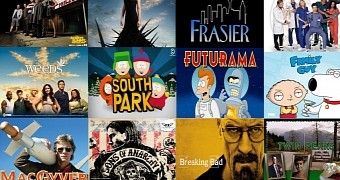Last night saw the premiere of the 7th and final season of “Sons of Anarchy,” the highest-rated drama on FX in the history of the network and a fan-favorite despite repeated Emmy snubs. This will be the final chapter in yet another bloody, original and brilliant television series that dared to change the way in which we perceive all TV shows – and succeeded.
We are truly living in the golden age of television. As Hollywood is becoming more and more predictable, with studios slaves to the almighty dollar and afraid to take risks anymore for fear that they might not pay off, television is daring to “go where no man has gone before,” delivering solid and stimulating entertainment.
“The Sopranos,” the show that got the ball rolling
It all started with the mobster series “The Sopranos” on HBO, more or less. A new type of hero rose (the antihero), and networks rushed to capitalize on this new trend that they’d be waiting for so long: the moment when audiences would turn to the small screen for quality products that delivered both entertainment and stimulating, intelligent topics.
From “The Sopranos” to “Breaking Bad,” “Game of Thrones,” “Weeds,” “Dexter” and the aforementioned “Sons of Anarchy” (though there are countless more other shows I could include here), we’re now seeing much better, original stories, solid acting and overall more interest from everyone involved to deliver A-grade entertainment to viewers at home.
Hollywood seems to have forgotten what entertainment is all about
At the opposite pole are big Hollywood movie studios, whose main concern seems to be that of making more money as quickly as possible. This is an overgeneralization, of course: you still get to go to the theater and catch a solid movie, but the majority of releases all follow the same proven recipe for success. Those that don’t are usually indies or films that barely register with the mainstream audience.
The moment you get to mistake “TMNT” for the last “Transformers” film is the day you know that Hollywood has forgotten what entertainment is all about. I’m not saying that Michael Bay’s movies don’t serve their purpose or that they’re really that bad, but it’s disheartening to see that they have become the norm.
A studio with a major franchise will do whatever possible to churn out one sequel per year, which means that most of these releases sacrifice a good story and even good acting in favor of a rushed release. There also seems to be this consensus with movie studios that a hefty amount of special effects / explosions / post-production work can compensate for flagrant plot holes or even bad acting.
TV shows have no choice but to deliver on a weekly basis, there is no compromise to be made on quality
Your favorite television series became just that because the people working on them had no other choice but to deliver solid entertainment on a weekly basis. Once you buy a ticket to a film, you can choose to stay to see it or walk out and no one from the studio will care which it is, as long as they have your money.
With television, the quality has to be there every week, or you’re not coming back. There are no second chances in television, and there is certainly no compromise to be made as far as quality is concerned.
So we’re getting bolder ideas, more unexpected twists, and just as importantly, more talented and experienced actors jumping on the TV bandwagon because, suddenly, this is where the steady money is. A Hollywood production might be quick pay, but an income from a television show that stays on the air for several seasons is no trifle. Plus syndication and reruns.
Television is no longer an actor’s career graveyard
When Al Pacino, Meryl Streep, Kevin Spacey and so many other respectable thespians turn to TV work, you know that television is a serious contender to Hollywood’s crown. That’s not to say that one is going to replace the other anytime soon but it does mean that movie studios had better up their game a bit if they want to draw in larger audiences, whilst keeping those they already have.
Sure, you will say, you can’t possibly compare the production scale of a movie to that of a TV show, and that’s why films compromise on storytelling in the rush to meet the one-year deadline. Of course you can! “Game of Thrones” is the best example of that: it has a budget and a production time comparable to that of a feature film, and it’s still not sacrificing quality.
If HBO can deliver a full season of high-quality, one-hour episodes each year, film studios should be able to do the same with their sequels, prequels, reboots and remakes. In the end, they might have to do just that – but it won’t be until they fully comprehend that they’re losing the race.

 14 DAY TRIAL //
14 DAY TRIAL //